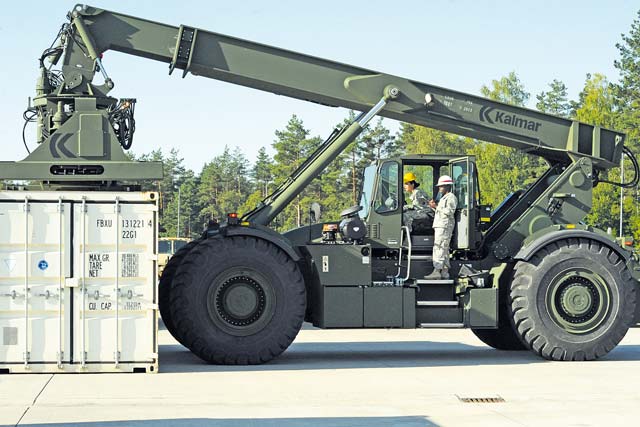
Soldiers from the 21st Theater Sustainment Command’s 16th Sustain-ment Brigade attended a two-week course on the Kalmar RT-240 Rough Terrain Container Handler Aug. 5 to 16 at Grafenwöhr Training Area.
The 14 students, who came from Kaiserslautern, Baumholder and Grafenwöhr, began the course with a week of classroom education covering all aspects of the RTCH. They learned about all mechanical components in the vehicle, how to conduct preventative maintenance checks and services, how to start the vehicle, and proper operation procedures.
The Soldiers were also instructed on connecting the vehicle’s boom to a container, said Staff Sgt. Erik A. Jordan, an instructor assigned to the 2nd Staff, Container Handler’s Division, U.S. Army Transportation School at Fort Eustis, Va.
“The first week of instruction was conducted in the classroom and covered any and all aspects of the Rough Terrain Container Handler these Soldiers might need to know,” Jordan said. “It is very important that they have an extensive knowledge of this machine before we put them in the driver’s seat.”
The second week of training was dedicated to hands-on operation of the RTCH in a controlled environment. Under strict observation, each Soldier drove the vehicle a short distance each day to familiarize themselves. They also practiced picking up and moving containers.
“The hands-on training was extremely helpful, and I learned a lot about how this machine operates and what it is capable of,” said Pfc. Cornelius A. Greene, a mechanic assigned to the 317th Support Maintenance Company, 16th Special Troops Battalion, 16th Sust. Bde. located in Baumholder, Germany.
After all classroom material is covered and the Soldiers are comfortable operating the vehicle, they are tested on their knowledge with a meticulously scrutinized driver’s test. Each student told their instructor each step in the process to start the vehicle, place it in gear, move the vehicle, attach the boom arm to a container, lift and transport the container, lower the container and place the vehicle back into park. All 14 Soldiers passed their exam and graduated.
“I got a 98 on my test, so I am pretty happy with the result,” said Spc. Yessinia, Y. Beyer, a cargo specialist with the 1st Inland Cargo Transfer Company, 18th Combat Sustainment Support Battalion, 16th Sust. Bde. “Even though I had some familiarity with this vehicle before I came to this class, I think what I learned here really made me an expert.”
As an added piece of knowledge on the last day of the class, the Soldiers learned how to place the RTCH in transport mode. Transport mode modifies the vehicle’s construction so it can be loaded to a C-5 or C-17 aircraft and flown to a new destination. This process involves moving the cab of the vehicle to the side, lowering the boom arm and extending wheels that were previously hidden.
“Showing these Soldiers how to place the RTCH in transport mode is important, especially with the redeployment and retrograde of materials and Soldiers from Afghanistan,” Jordan said. “If these Soldiers work in a container yard downrange and their equipment needs to come home, they will need to know how to transport this vehicle.”
All 14 Soldiers, whose military occupational specialties included wheeled vehicle mechanic, cargo specialist and generator mechanic, felt the training was beneficial and would benefit them in the future.
“Just because I am a mechanic doesn’t mean that I will not be asked to work in a container yard or to operate the RTCH,” Greene said. “I think this class prepared me for the future and made me a more diverse Soldier.”







